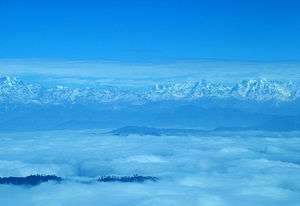Binsar Wildlife Sanctuary
Binsar Wildlife Sanctuary is an Indian wildlife sanctuary.[1]
| Binsar Wildlife Sanctuary | |
|---|---|
IUCN category IV (habitat/species management area) | |
Oaks on a mountain slope in Binsar Wildlife Sanctuary | |
| Location | Uttarakhand, India |
| Nearest city | Almora |
| Coordinates | 29°37′56″N 79°20′15″E |
| Area | 45.59 km2 |
| Established | 1988 |
| Governing body | Department of Forest Uttarakhand |
Binsar was the summer capital of the Chand Kings, who ruled over Kumaon from the 11th to 18th centuries AD. Binsar was established in 1988 for the conservation and protection of the shrinking broad leaf oak (Quercus) forests of the Central Himalayan region, and it has over 200 bird species.
Geography
It sits on top of the Jhandi Dhar hills in the Himalayas, about 33 km north of Almora town in Uttarakhand. The sanctuary spreads over 45.59 km2. Its altitude varies from 900 to 2500 metres with an average height of 2412 metres. The temperature of this area is about 20° C.
From a place called Zero Point the Himalayan peaks Kedarnath Peak, Shivling, Trisul and Nanda Devi are visible.
Flora and fauna
Binsar has a museum about the flora and fauna of the region. The sanctuary hosts 25 types of trees, 24 types of bushes and 7 varieties of grasses. The higher altitudes are covered with oak and rhododendron trees. In March and April, flowers, especially ruby red rhododendron, are in full bloom.
Mammals include leopard (Panthera pardus), Himalayan goral (Naemorhedus goral), chital (Axis axis), musk deer (Moschus spp.), Sumatran serow (Capricornis sumatraensis), jungle cat (Felis chaus), wild boar (Sus scrofa), pine marten (Martes martes), red fox (Vulpes vulpes), gray langur (Presbytis entellus), rhesus macaque (Macaca mulatta), red giant flying squirrel (Petaurista petaurista), and Indian muntjac (Muntiacus muntjak). In the past black bear (Ursus thibetanus) had been recorded.
Binsar hosts over 200 species of birds including tits, forktail, nuthatches, blackbirds, parakeets, laughingthrush, magpies, kalij pheasant (Lophura leucomelana), monal, koklass pheasant, eagles, woodpeckers, and Eurasian jays. [2]
Binsar is home to many reptiles and butterflies.
History

Grand Oak Manor
The Grand Oak Manor is the erstwhile home of Sir Henry Ramsay who used it as his summer home and administrative centre as Commissioner of Kumaon. The property later became a heritage hotel.
Khali estate
The Khali estate was once owned by Sir Henry Ramsay, who was the commissioner of Kumaun from 1856 to 1884 and called by British authors the King of Kumaun. He built a bungalow at Binsar. Vijay Laxmi Pandit, the sister of Jawahar Lal Nehru, also lived there.
Other prominent people who have been guests/owners of this estate include Pt. Jawaharlal Nehru, Indira Gandhi and Mahatma Gandhi.
Mary Budden estate
The Mary Budden estate located at 8000 feet is a restored colonial home and a temple to Shiva.[3]
Binsar Forest Retreat
Binsar Forest Retreat is an eco-friendly homestay situated at an altitude of 7,600 ft on the southwest flank of Binsar Wildlife Sanctuary. The Retreat is surrounded by the Binsar forest, with views of the higher Himalayas to the north and the valleys and hills to the south and west.[4]
See also
References
- "10 Epic Safaris To Try In 2020". www.outlookindia.com. Retrieved 2 February 2020.
- "Birds of Binsar".
- "Mary Budden Estate. Binsar. Luxury boutique homestay in the Himalayas 2011. www.marybuddenestate.in. Binsar Hotel, Binsar Guest house, Binsar Eco-friendly hotel, Binsar Wild Life Sanctuary hotel, Binsar forest guest house, Binsar retreat, Binsar resort". www.marybuddenestate.in.
- "Binsar Forest Retreat | An eco-friendly homestay in Uttarakhand Himalaya". Binsar Forest Retreat.